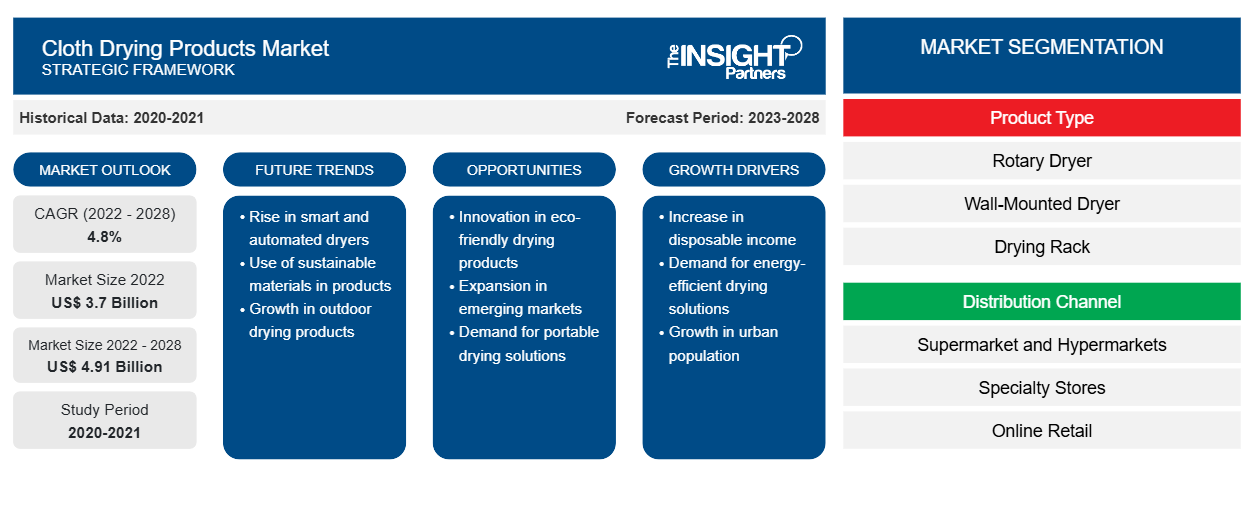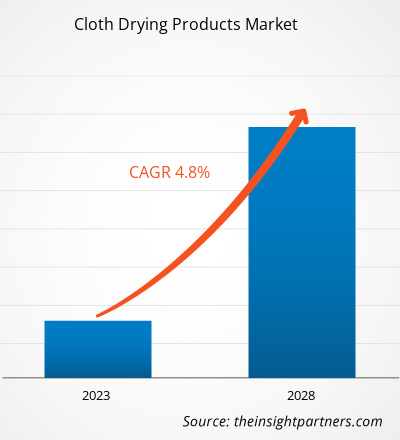The cloth drying products market is projected to reach US$ 4,910.54 million by 2028 from US$ 3,697.85 million in 2022. It is expected to grow at a CAGR of 4.8% during 2022-2028.
The demand for cloth drying products has increased due to unpredictable weather conditions. Most people rely on them rather than the sun to dry their clothes after washing because the weather is usually gloomy, forcing them to hang their clothes inside to dry. Additionally, as products with drying products are less expensive and take up less space, consumers benefit from the movement in consumer preferences away from energy-consuming dryers. All these factors are projected to drive the growth of the cloth drying products market during the forecast period.
The cloth drying products market size is projected to witness significant growth in the coming years due to the strong presence of prominent players, such as Inter IKEA Systems B.V., RACKBUDDY, and Addis Housewares Ltd., operating actively across the world. The eco-friendly products have gained significant traction among environment-conscious consumers. There has been a growing trend among consumers toward using eco-friendly products, leading to the cloth drying products market growth. This factor is projected to offer new opportunities to cloth drying product manufacturers during the forecast period.
In 2021, North America held the key share of the global cloth drying products market. However, Asia Pacific is estimated to register the highest CAGR in the market during the forecast period. The Asia Pacific cloth drying product market is segmented into China, India, Australia, Japan, South Korea, and the Rest of Asia Pacific. The laundry industry is one of the booming industries in Asia Pacific due to the construction of small housing units, brought in by rapid urbanization and the increase in demand for small, portable residential goods. Consumers in developing countries are experiencing a sharp increase in their disposable income, raising their purchasing power. Various home products, including cloth drying products, are witnessing a surge in demand. The rising disposable income levels of consumers and the growth of the middle-class population are among the key factors driving the demand for laundry products in the region. Furthermore, this region has a significant demand for eco-friendly cloth drying products.
Customize This Report To Suit Your Requirement
You will get customization on any report - free of charge - including parts of this report, or country-level analysis, Excel Data pack, as well as avail great offers and discounts for start-ups & universities
Cloth Drying Products Market: Strategic Insights

-
Get Top Key Market Trends of this report.This FREE sample will include data analysis, ranging from market trends to estimates and forecasts.
Impact of COVID-19 Pandemic on Cloth Drying Products Market
Before the COVID-19 pandemic, the cloth drying products market growth was primarily driven by the rising demand for affordable and durable laundry dryers. Before the COVID-19 pandemic, the demand for cloth drying products was also driven by their flexibility, modern designs, and easy installation. However, the cloth drying products market faced negative impacts of the pandemic during the first quarter of 2020 due to business shutdown and raw material and labor shortages. The COVID-19 pandemic also led to economic recession in the initial months of 2020, which created financial difficulties for low-income and mid-income consumers. Consumers only preferred essential goods, such as groceries and medical products, due to the financial crisis. Thus, with depressed incomes, the demand for nonessential goods decreased, which reduced the profits of many small-scale and large-scale laundry dryer manufacturers.
Moreover, the retailers of nonessential goods were mandated to keep their stores shut during the first few months of the outbreak, negatively impacting the sales of cloth drying products. However, as consumers were stuck inside their homes, they spent time on housework, such as cleaning, cooking, washing clothes and sheets, and gardening. Some consumers also found washing and drying laundry in open air pleasurable as they could spend some time in the garden and open spaces, which positively impacted the sales of laundry drying products.
Market Insights
Benefits of Line Drying Over Machine/Tumble Drying
Line drying of clothes is quite beneficial, especially when compared to machine drying or tumble drying. Tumble dryers use excessive heat to dry out the laundry, which reduces their shine and causes wear and tear to fabrics. Some delicate fabrics get damaged due to excessive heat used by tumble dryers, and the damage caused is sometimes irreversible.
Line drying is gentle on clothes, increasing their life and providing natural shine to the fabrics. It is also helpful in preventing wrinkles and creases on clothes, eventually eliminating the need for ironing. Line dryers or drying racks are much more affordable than machine dryers. Moreover, they require less cost of maintenance than machine dryers.
The use of bleaches and harsh fabric cleaners can be avoided by line drying clothes in sunlight as the sun's ultraviolet (UV) rays act as a natural bleaching agent and kill bacteria and pathogens in the fabrics. Thus, cloth drying products are increasingly being utilized due to factors mentioned above.
Category Insights
Based on product type, the global cloth drying products market is segmented into rotary dryer , wall-mounted dryer, and drying rack. In 2021, the drying rack segment accounted for the largest revenue share, while the wall-mounted dryer segment is expected to account for the highest growth rate over the forecast period. Drying racks are portable, compact, and suitable for small settings. They are suitable for use both indoors and outdoors. Some manufacturers provide wheels to the drying racks to move them easily from one place to another. Drying racks may have one single drying clothesline with foldable legs or foldable wings and legs that provide additional drying space. Drying racks require very small space for storage, making them ideal for small apartments.
Moreover, drying racks are made of durable and sturdy materials that can hold the entire laundry load of a family. Manufacturers of drying racks offer products with contemporary designs that are suitable for modern apartments. The rising urban population and demand for compact and durable laundry drying products are the key factors driving the segment’s growth.
Addis Housewares Ltd.; Brabantia Branding B.V.; Honey-Can-Do International LLC; Freudenberg Home and Cleaning Solutions GmbH; INTER IKEA SYSTEMS B.V.; JOMOO KITCHEN & BATH CO., LTD.; Julu Ltd.; RACKBUDDY; Vale Mill (Rochdale) Ltd.; Juwel; and Leifheit AG are the players operating in the cloth drying products market. These companies provide a wide range of product portfolios for the market. The companies have their presence in developing regions, providing lucrative market opportunities. Market players are developing high-quality, innovative products to meet customer requirements.
Cloth Drying Products Market Regional InsightsThe regional trends and factors influencing the Cloth Drying Products Market throughout the forecast period have been thoroughly explained by the analysts at The Insight Partners. This section also discusses Cloth Drying Products Market segments and geography across North America, Europe, Asia Pacific, Middle East and Africa, and South and Central America.
Cloth Drying Products Market Report Scope
| Report Attribute | Details |
|---|---|
| Market size in 2022 | US$ 3.7 Billion |
| Market Size by 2028 | US$ 4.91 Billion |
| Global CAGR (2022 - 2028) | 4.8% |
| Historical Data | 2020-2021 |
| Forecast period | 2023-2028 |
| Segments Covered |
By Product Type
|
| Regions and Countries Covered |
North America
|
| Market leaders and key company profiles |
|
Cloth Drying Products Market Players Density: Understanding Its Impact on Business Dynamics
The Cloth Drying Products Market is growing rapidly, driven by increasing end-user demand due to factors such as evolving consumer preferences, technological advancements, and greater awareness of the product's benefits. As demand rises, businesses are expanding their offerings, innovating to meet consumer needs, and capitalizing on emerging trends, which further fuels market growth.

- Get the Cloth Drying Products Market top key players overview
Report Spotlights
- Progressive industry trends in the cloth drying products market to help players develop effective long-term strategies
- Business growth strategies adopted by developed and developing markets
- Quantitative analysis of the cloth drying products market size from 2020 to 2028
- Estimation of global demand for cloth drying products
- PEST analysis to illustrate the efficacy of buyers and suppliers operating in the industry
- Recent developments to understand the competitive market scenario
- Market trends and outlook and factors driving and restraining the growth of the cloth drying products market
- Assistance in the decision-making process by highlighting market strategies that underpin commercial interest, leading to the market growth
- The size of the cloth drying products market size at various nodes
- Detailed overview and segmentation of the market, as well as the cloth drying products industry dynamics
- Cloth drying products market size in various regions with promising growth opportunities
The "Global Cloth Drying Products Market Analysis to 2028" is a specialized and in-depth study of the consumer goods industry with a special focus on the global cloth drying products market trend analysis. The report aims to provide an overview of the market with detailed market segmentation.
The cloth drying products market is analyzed based on product type, distribution channel, and geography. Based on product type, the global cloth drying products market is segmented into rotary dryer, wall-mounted dryer, and drying rack. Based on distribution channel, the global cloth drying products market is segmented into supermarkets and hypermarkets, specialty stores, online retail, and others. By geography, the market is broadly segmented into North America, Europe, Asia Pacific (APAC), Middle East & Africa (MEA), and South and Central America.
Company Profiles
Addis Housewares Ltd.; Brabantia Branding B.V.; Honey-Can-Do International LLC; Freudenberg Home and Cleaning Solutions GmbH; INTER IKEA SYSTEMS BV; JOMOO KITCHEN & BATH CO., LTD.; Julu Ltd.; RACKBUDDY; Vale Mill (Rochdale) Ltd.; Juwel; and Leifheit AG are the prominent players operating in the global cloth drying products market.
Frequently Asked Questions
What are the trends observed in the global cloth drying products market?
Based on the distribution channel, which segment led the global cloth drying products market in 2021?
Which type segment is the fastest growing in the cloth drying products globally?
What are the drivers for the growth of the global cloth drying products market?
Can you list some major players operating in the global cloth drying products market?
In 2021, which region held the largest share of the global cloth drying products market?
- Historical Analysis (2 Years), Base Year, Forecast (7 Years) with CAGR
- PEST and SWOT Analysis
- Market Size Value / Volume - Global, Regional, Country
- Industry and Competitive Landscape
- Excel Dataset
Recent Reports
Testimonials
Reason to Buy
- Informed Decision-Making
- Understanding Market Dynamics
- Competitive Analysis
- Identifying Emerging Markets
- Customer Insights
- Market Forecasts
- Risk Mitigation
- Boosting Operational Efficiency
- Strategic Planning
- Investment Justification
- Tracking Industry Innovations
- Aligning with Regulatory Trends





















 Get Free Sample For
Get Free Sample For